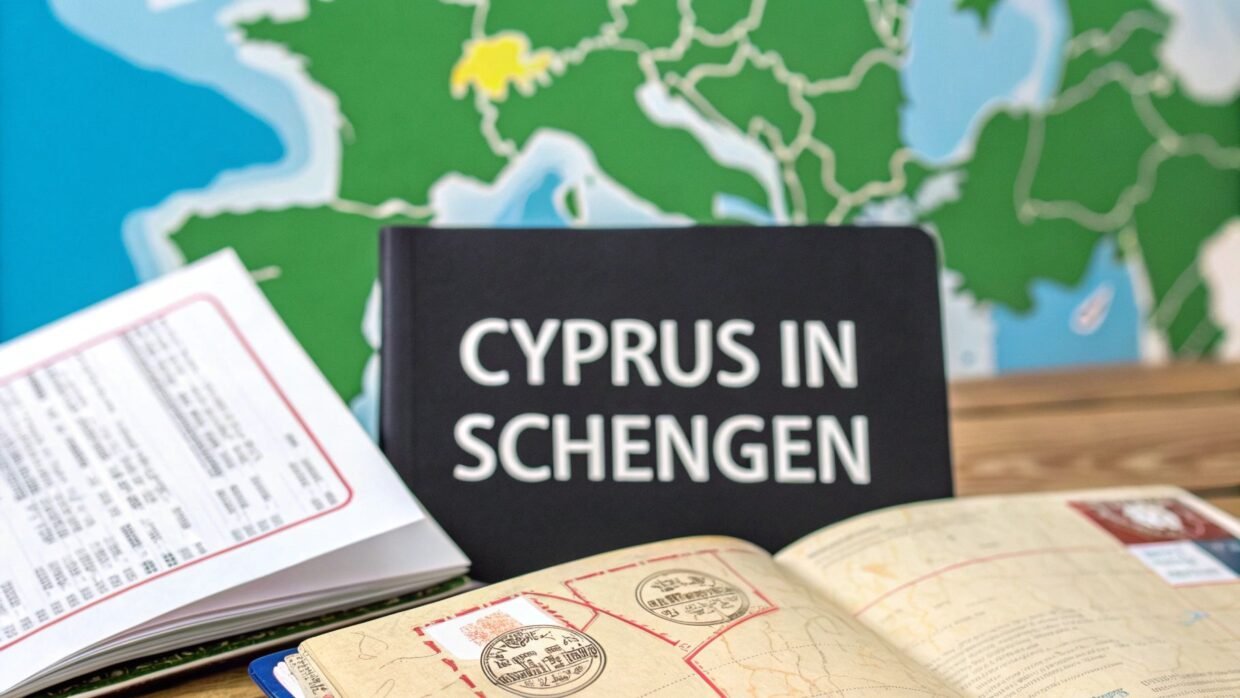Let's cut straight to the chase: Cyprus is not currently part of the Schengen Area.
Even though it’s a member of the European Union and legally required to join, it hasn’t ticked all the boxes just yet. This means when you fly to Cyprus, you can expect to go through the standard passport and border controls when you land.
Understanding Cyprus and the Schengen Zone
Imagine the Schengen Area as a massive club where members can travel between countries without showing their passports at every border. It’s a bit like driving from England to Wales – you just cross over without any checks. Most EU countries are in this club, but a few, including Cyprus, are still on the waiting list.
The hold-up? Joining isn't as simple as just signing a form. Cyprus has to meet some seriously tough requirements for things like airport security, visa policies, and sharing information with other member states.
This image here gives you a great visual breakdown of how the EU and Schengen memberships overlap. You can clearly see Cyprus is one of the few EU countries still outside the main free-travel zone.
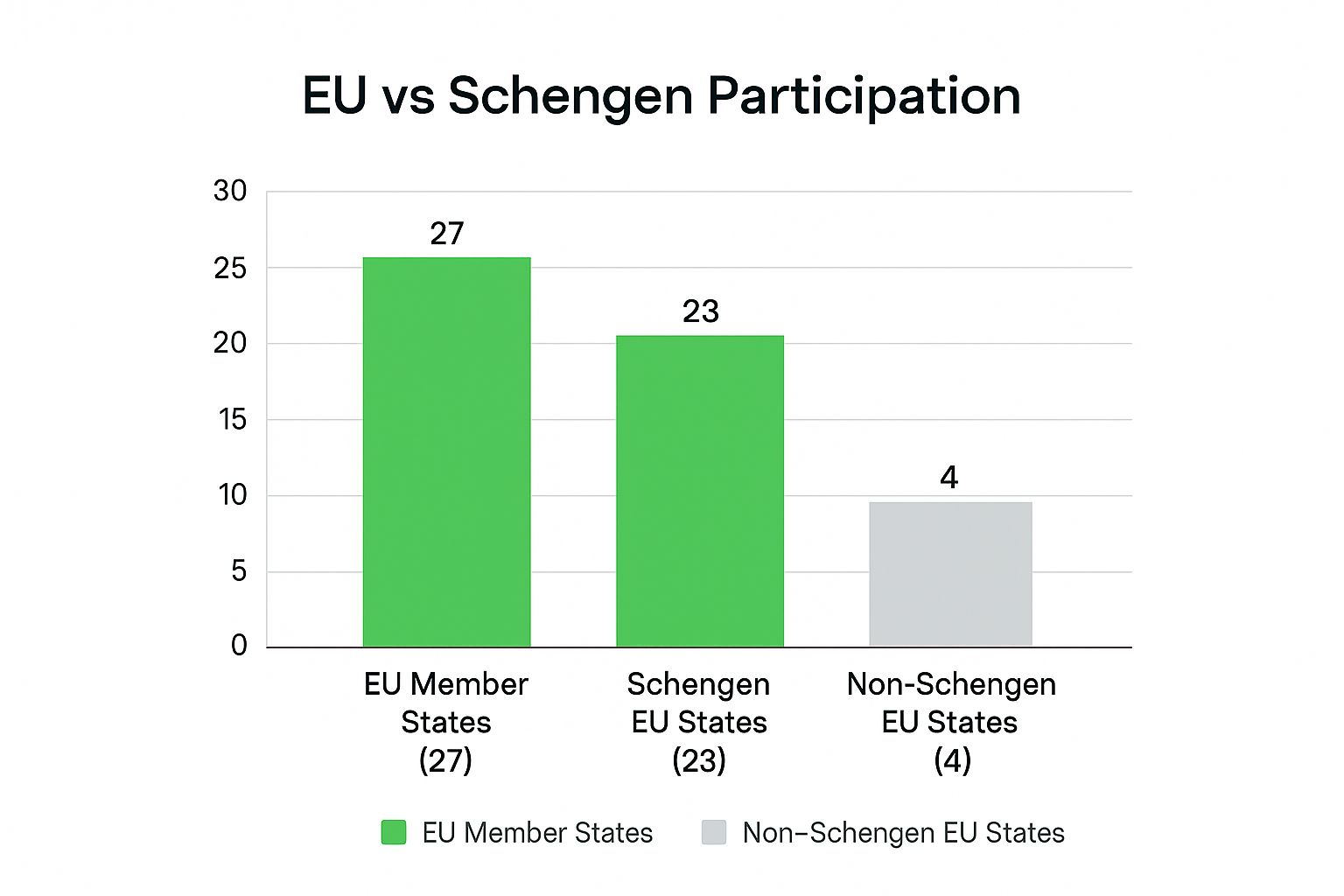
As the diagram shows, while most of the EU enjoys the perks of Schengen, four countries, Cyprus included, are still separate from this arrangement.
Cyprus's Path to Membership
Don’t get the wrong idea, though – things are moving forward. Cyprus is actively working to get its membership approved and has reached the final stages of the process. The government has set a target of early 2025 to get all the technical and legal bits and pieces sorted.
This involves some major upgrades to its border control systems and databases to get them in line with Schengen standards. You can read more about the final preparations for Cyprus to join the Schengen zone.
So, while the answer to "is Cyprus in Schengen?" is a 'no' for now, the situation is definitely on track to change in the near future.
What Is the Schengen Area and Why Is Cyprus Still Separate?
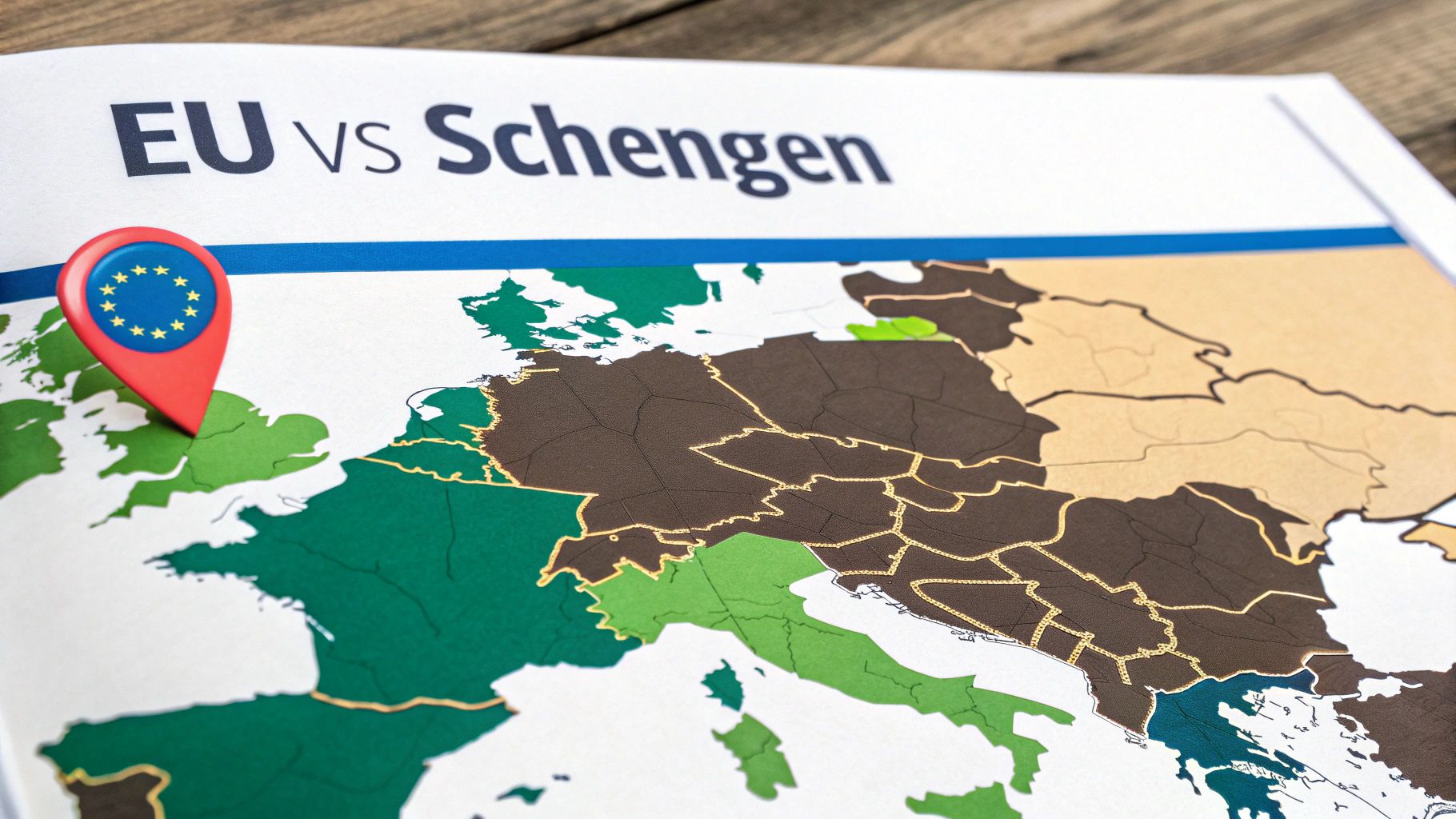
To really get to grips with Cyprus's border situation, you first need to understand what the Schengen Area is. It's a common point of confusion, but it's crucial to remember: the Schengen Area and the European Union are not the same thing, even though their members overlap quite a bit.
Think of it like this: the Schengen Area is a massive club for passport-free travel. Once you're inside the club's main entrance (the external Schengen border), you can wander freely between all the different rooms (the member countries) without anyone asking for your passport again. It’s all about seamless movement.
Cyprus, while being a full member of the wider community (the EU), isn't part of this passport-free club just yet. It's like a house on the same street, but with its own front door and security system. To learn more about its EU status, you can read our guide explaining if Cyprus is in the EU and what that membership entails.
The Reasons for the Delay
So, why the wait? Getting into the "Schengen club" is a very big deal. It's not an automatic benefit of EU membership; countries have to prove they're ready for the responsibility. For Cyprus, a few key factors have slowed things down.
The biggest obstacle, without a doubt, is the island's unique political situation. The de facto division of the island creates complex challenges for security and border management. Before Cyprus can join, these issues need to be resolved in a way that satisfies every single existing Schengen member.
At its heart, the Schengen Agreement is built on trust. It demands the complete removal of internal border checks, which can only work if every country has absolute confidence in the security of the shared external borders. Gaining entry requires a unanimous 'yes' vote from all current members.
Beyond the political landscape, there's also a battery of tough technical tests Cyprus must pass. These evaluations make sure the country's infrastructure is up to the task of guarding a piece of the Schengen external border. This is a huge responsibility and involves checking several key areas:
- Airport and Seaport Security: All entry points must be brought up to the strictest security standards.
- Data Protection: Cyprus must have solid data privacy laws that align with the rest of the Schengen zone.
- Police and Judicial Cooperation: It needs to demonstrate flawless cooperation with law enforcement agencies across all member states.
Until every single one of these political and technical boxes is ticked, Cyprus will continue to manage its own national border controls, keeping it separate from the passport-free travel area for the time being.
Cyprus's Journey Towards Joining Schengen
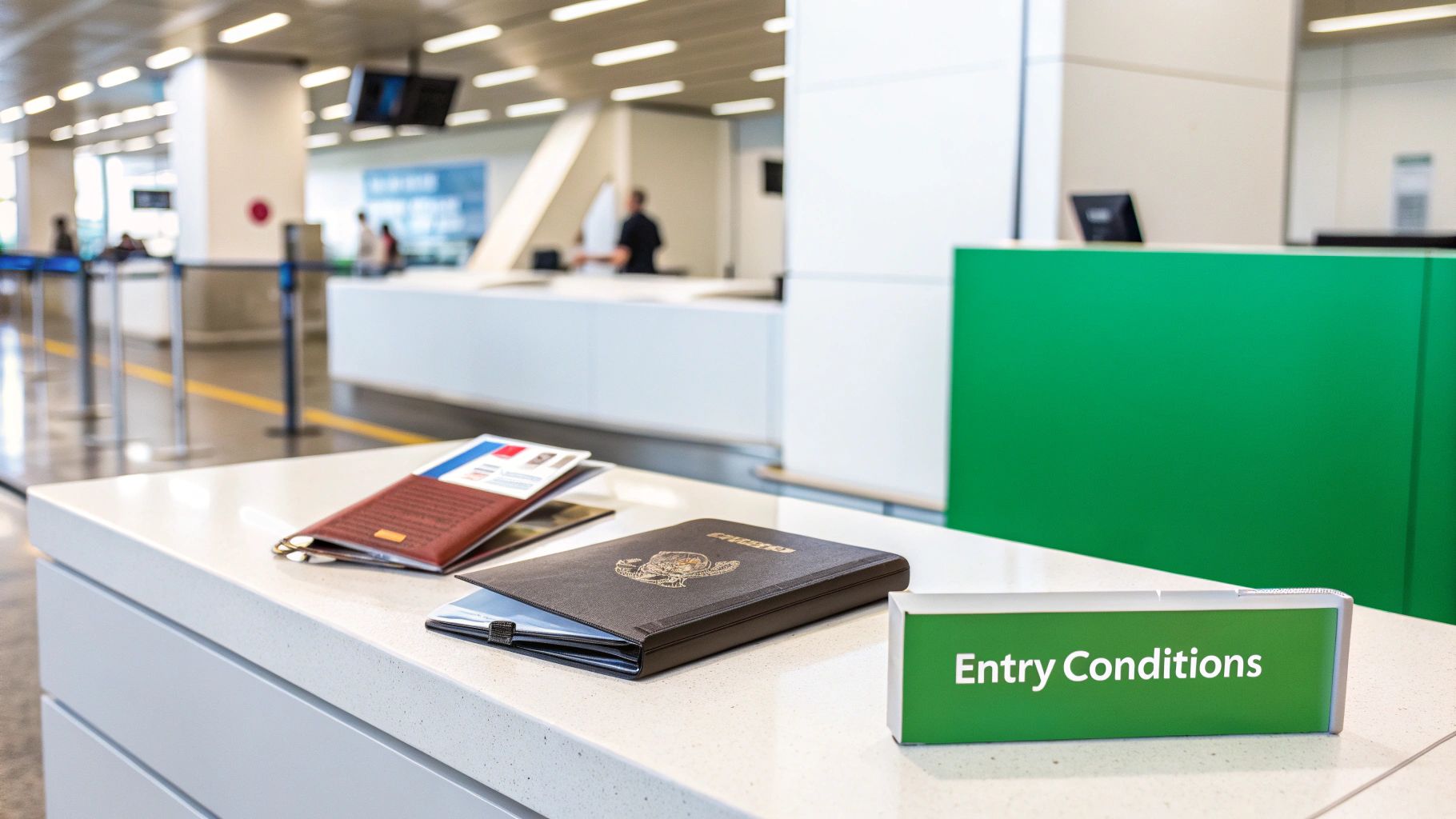
Cyprus isn't just sitting back and hoping for an invitation to the Schengen Area; it's actively working to meet the club's incredibly strict requirements. This journey is a marathon, not a sprint, involving major technical overhauls and a series of tough evaluations.
A huge leap forward happened in July 2023 when Cyprus successfully connected to the Schengen Information System (SIS). Think of the SIS as the shared security brain for the entire Schengen territory—a massive, real-time database linking police, border guards, and legal authorities across all member states.
By plugging into this system, Cyprus has effectively installed the high-tech security framework needed to guard the bloc's shared external border. It means Cypriot authorities can now instantly share and receive critical alerts on wanted persons, stolen property, and other security matters with 29 other countries. This was a non-negotiable step, proving Cyprus is ready to shoulder its security responsibilities. You can find more details about this crucial step towards joining Schengen.
The Final Hurdles to Clear
With the SIS connection sorted, Cyprus has entered the final leg of its application. This part involves a series of on-site evaluations by EU experts, which are a bit like the final inspections before a building is officially signed off.
Joining Schengen is fundamentally about mutual trust. Cyprus must demonstrate beyond any doubt that it can effectively manage its section of the EU's external frontier, from its airports to its coastlines, maintaining the security of the entire zone.
These last checks will take a close look at several key areas to make sure they are up to the demanding Schengen standards:
- Air and Sea Ports: Examiners will run a fine-tooth comb over procedures at Larnaca and Paphos airports, as well as the main seaports, to ensure border controls are watertight.
- Data Protection Laws: They’ll verify that Cyprus’s data privacy rules are perfectly aligned with the rest of the Schengen countries, ensuring personal information in the SIS is protected.
- Consular Cooperation: The teams will also assess how Cypriot embassies and consulates issue visas to make sure the process is both consistent and secure.
Passing these evaluations is the final major chapter in Cyprus's long story. Once the evaluation committees give the thumbs-up, the last political decision can finally be made, bringing the island one giant step closer to passport-free travel.
How a Schengen Cyprus Will Impact UK Travellers
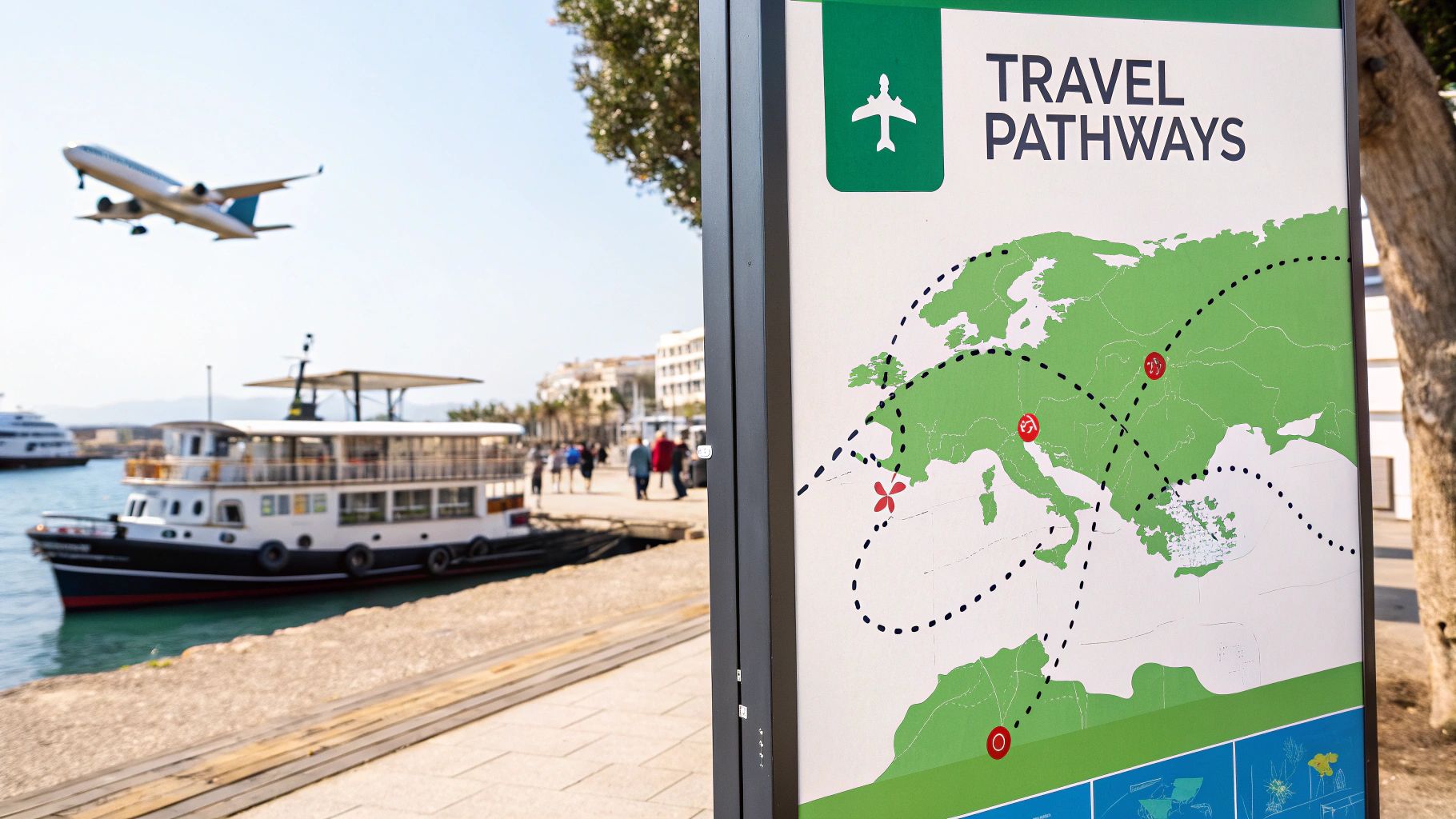
So, what happens to your holiday plans or extended stays once Cyprus officially becomes part of the Schengen Area? For UK citizens, the biggest shift won't be at the airport check-in. Since the UK isn't in the passport-free zone, you'll still need to show your passport on arrival, just as you do now.
The real change is all about how you count your days. At the moment, Cyprus is a bit of a loophole for Brits who love to spend lots of time in Europe. It has its own, separate 90-day visa-free allowance, which doesn't affect your time spent in other EU countries.
The 90 in 180-Day Rule Explained
Once Cyprus joins Schengen, that separate allowance vanishes. Your time on the island will be lumped in with your stays in France, Greece, Portugal, and anywhere else in the zone. Everything will be governed by the standard 90/180-day rule. This rule means non-Schengen nationals can only be in the entire area for a maximum of 90 days within any 180-day window.
This is a pretty big deal for a few groups of people:
- Frequent Travellers: If you're hopping between European countries all year, you'll need to be much more careful with your calendar to avoid an accidental overstay.
- Holiday Home Owners: Those with a property in Cyprus who enjoy long spells in the sun will have to juggle their time there with any other trips to the continent.
- Digital Nomads: Working remotely from Europe will demand some serious planning to make sure you're legally compliant across the whole Schengen zone.
The bottom line is this: once the switch happens, a two-week holiday in Cyprus will eat up 14 days of your total 90-day Schengen allowance, exactly the same as a trip to Spain or Italy.
For the average person taking a week or two of holiday, this change will barely register. But for anyone planning longer-term European adventures, the game changes. The days of using Cyprus as a clever "reset button" for your Schengen clock will be gone.
Beyond just travel days, this move also signals deeper integration. It will likely impact everything from security data sharing between the UK and Schengen nations to how issues like lost passports or criminal records are handled. You can read more about the implications of Cyprus joining Schengen and what it means for outsiders.
Current Entry Rules and Border Control for UK Citizens
So, we've established that Cyprus isn't in the Schengen Area just yet. But what does that actually mean for your holiday plans right now? For UK citizens, the good news is that the process is refreshingly straightforward and probably feels quite familiar, mirroring how travel to non-EU countries worked long before Brexit.
When you land at Larnaca or Paphos airport, you'll need to head to passport control. Unlike hopping between countries like Spain and France where you can often just walk through, Cyprus maintains full border checks. Every traveller has their documents inspected by an immigration officer, both on arrival and when they leave.
For anyone holding a UK passport, you can visit Cyprus for tourism without needing a visa. You’re permitted to stay for up to 90 days within any 180-day period. Crucially, this 90-day allowance is just for Cyprus and is completely separate from your 90/180-day limit for the main Schengen zone. It’s a real bonus for those who spend a lot of time in Europe.
Before you even think about packing, check your passport. It's the most important step. Your passport must have been issued less than 10 years ago and needs to be valid for at least three months after the day you plan to fly home from Cyprus.
Who Needs What to Enter Cyprus?
To clear up any confusion, entry rules change depending on your nationality. While it’s simple for UK visitors, the requirements are different for EU citizens and travellers from other parts of the world. For a complete breakdown, our dedicated guide covers the specific visa requirements for visiting Cyprus in much more detail.
To give you a quick snapshot, here’s a summary of the current entry rules for different nationalities.
Current Visa & Entry Requirements for Cyprus
This table provides a simple overview of what most travellers need to enter Cyprus for a short stay.
| Nationality | Visa Requirement for Stays up to 90 Days | Key Entry Document |
|---|---|---|
| UK Citizens | Visa-free | Valid Passport |
| EU/EEA/Swiss Citizens | Visa-free (Freedom of Movement) | National ID Card or Passport |
| Other Nationalities | Varies (Check official requirements) | Passport & potential Visa |
As you can see, the requirements are quite different depending on where you're from. Always double-check the official advice for your specific passport before booking any travel.
Your Top Questions About Cyprus and Schengen Answered
Figuring out the ins and outs of European travel zones can feel a bit like untangling a ball of yarn. It's completely normal to have questions, so let’s clear up some of the most common ones about Cyprus and its place in the Schengen Area.
Is Northern Cyprus Part of the Schengen Discussion?
That's a definite no. The northern part of the island isn't part of the European Union, so it's not even in the running to join the Schengen Area.
When you hear news about Cyprus joining Schengen, it’s always referring to the Republic of Cyprus—the internationally recognised government controlling the island's south. Travelling between the two sides means crossing a UN-controlled buffer zone, which comes with its own set of rules and checkpoints.
While you're planning, it's always a good idea to get a feel for the local situation. We've put together a helpful guide on whether Cyprus is a safe destination that you might find useful.
Will I Need an ETIAS for Cyprus?
Eventually, yes, but not right now. The European Travel Information and Authorisation System (ETIAS) is a new electronic permit for travellers who don't need a visa to enter the Schengen Area, including those from the UK.
Here’s how it breaks down for Cyprus:
- For now: Since Cyprus isn’t in the Schengen Zone yet, you don't need an ETIAS to visit. Your passport is enough.
- In the future: Once Cyprus officially becomes a Schengen member, you'll need to apply for an ETIAS online before you travel.
It’s best to think of ETIAS as a quick security pre-check, not a full-blown visa. It’s designed to screen visitors against security databases before they even get on the plane, beefing up safety across the bloc. The system is slated to go live for all Schengen countries in mid-2025.
What Is the Biggest Misconception About Cyprus and Schengen?
By far, the most common mistake people make is assuming that because a country is in the EU, it must also be in the Schengen Area. That's simply not the case. Cyprus has been a proud member of the EU since 2004, but joining Schengen is a completely separate process with a much higher bar to clear.
Think of it this way: EU membership is about economic and political union, while Schengen is all about shared borders and security. One doesn't automatically grant you entry into the other.
This is exactly why you still have your passport checked and stamped when you fly into Larnaca or Paphos, even if you’re coming from another EU country like Germany or France. Cyprus is in the EU club, but it’s still waiting for its membership card to the passport-free travel club.









